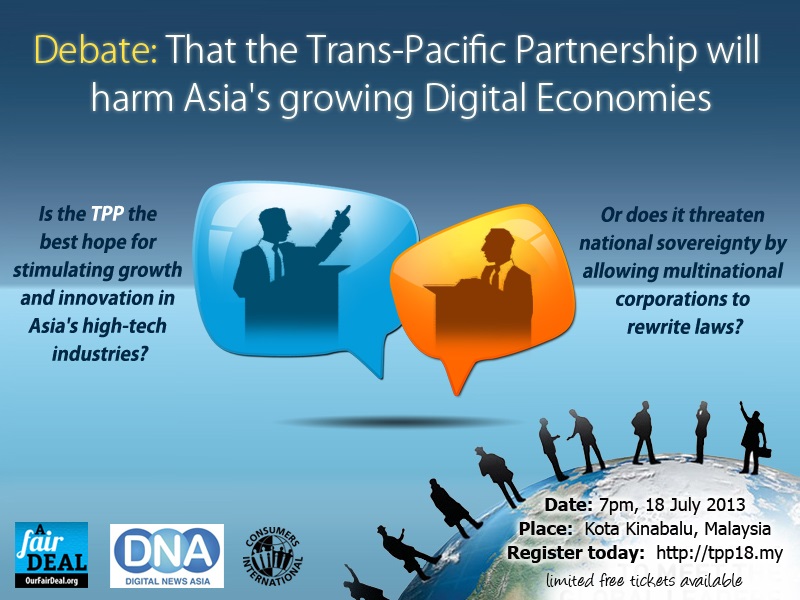The TPP: Good or bad for Asia’s rising digital economies?
By A. Asohan July 9, 2013
- The TPP is either going to allow emerging nations to reap rich benefits; or put them at the mercy of large multinationals
- Opinions are polarised: Consumers International and DNA to host free public debate between proponents and opponents
IT is the most radical multi-nation trade agreement ever envisaged, but was described by CNBC as The Huge Trade Deal You've Probably Never Heard Of.
The Trans-Pacific Partnership agreement (TPP, also known as the TPPA) currently involves 12 countries: Australia, Brunei, Canada, Chile, Japan (the latest to join talks), Malaysia, Mexico, New Zealand, Peru, Singapore, the United States and Vietnam.
The 18th round of TPP negotiations will take place in Kota Kinabalu on July 15-24, 2013, with Malaysia playing host.
While many are describing it as a US-initiated agreement, the TPP began as an expansion of what was previously called the Trans-Pacific Strategic Economic Partnership that was put together in 2003 by Singapore, New Zealand and Chile. The United States entered talks in 2008 under the Bush Administration, with the Obama Administration now taking the lead.
In a statement released after the November 2011 talks, the trade ministers involved described the TPP as a comprehensive, next-generation regional agreement that would liberalise trade and investment, and address new and traditional trade issues and 21st-century challenges.
“We are confident that this agreement will be a model for ambition for other free trade agreements in the future, forging close linkages among our economies, enhancing our competitiveness, benefitting our consumers and supporting the creation and retention of jobs, higher living standards, and the reduction of poverty in our countries,” they said in the statement.
Malaysia lobbied to become a full negotiating member and was accepted into the talks in 2010. In a statement released then, the Ministry of International Trade and Industry (MITI), the lead negotiator for Malaysia, said that the agreement “offers an excellent platform to realise the creation of a huge market, encompassing some of the biggest economies in the Asia Pacific region.”
“With the United States being an existing TPP member, this would enable an additional 11.7% of Malaysia's global trade to be accorded preferential treatment – bringing the total figure to 71.2% of Malaysia's global trade.
“Malaysia will also enjoy elimination of specific duties on cocoa products, petroleum oils, textiles and apparel, footwear, metal products and clocks and watches,” MITI said in the statement.
Paul A. Brown, counsellor for economic affairs at the US Embassy in Kuala Lumpur, wrote in The Malaysian Insider that Malaysia is set to be one of the biggest winners of the TPP.
Citing a study by international economic think-tank the Peterson Institute, he said that Malaysia would benefit from as much as US$40 billion in annual export gains and US$25 billion in annual income gains by 2025.
“[The] TPP would give Malaysia preferential access to the US$15-trillion US economy, including access to the US$500 billion in annual US Government procurement tenders,” Brown wrote.
Yet the agreement and specific clauses are shrouded in secrecy, with allegations coming to light that the nations involved in the talks had to sign a memorandum of understanding that would make the details of the agreement confidential for four years after an agreement is reached.
Lori Wallach, director of Public Citizen's Global Trade Watch, has revealed an exception to this rule, saying that a group of some 600 trade advisors, representing some of the biggest US businesses, enjoy privileged access to the draft texts and negotiators.
Consumer and environment groups in almost all the 12 countries are protesting, on the basis of documents leaked on the Internet, which is the only information that is currently available to those not at the negotiating tables – including the citizens of the nations involved, advocacy groups and even individual trade associations that will be directly affected.
“One of the issues that has caused grave concern is a set of rules in the TPP which apparently would empower foreign corporations to bypass domestic laws and courts and challenge government policies and regulations aimed at protecting the public interest via tribunals linked to the World Bank and the UN,” said International Movement for a Just World (JUST) president Dr Chandra Muzaffar.
Opposition MP Nurul Izzah Anwar has urged the Malaysian Government to establish a parliamentary group of experts to study the TPP, noting that its extensive scope and scale markedly exceeds those of previous free-trade agreements.
“Invariably, we are extremely worried that the Government will sign the TPP agreement without first seeking public opinion, or being attentive to the concerns and sentiments of the people of Malaysia,” she said in a statement.
The Electronic Frontier Foundation (EFF) says that the part of the TPP that cover copyright laws would “rewrite global rules on intellectual property enforcement.”
“The leaked US IP chapter includes many detailed requirements that are more restrictive than current international standards, and would require significant changes to other countries’ copyright laws,” the EFF said.
 Airing the issue in public
Airing the issue in public
The TPP offers a golden opportunity for Malaysia and other nations to reap the rich rewards of global trade -- or it poses a dire threat to our sovereignty that would allow foreign multinational corporations to rewrite our laws for their own benefit.
Opinions about the merits of the TPP are polarised, making it difficult for ordinary citizens to separate fact from fiction.
So what better topic for a debate, to clear the air and shed some light on this impenetrable and controversial subject?
Consumers International, in partnership with Digital News Asia, is hosting a free public three-on-three Parliamentary-style debate on the proposition “That the TPP will harm Asia’s growing Digital Economies.”
Drawn from across government, industry and NGO communities across the region, the participants will attempt to convince the audience that the TPP is the best hope for stimulating growth and innovation in Malaysia's high-tech industries; or that it will hamstring those industries with inappropriate laws pushed by foreign interests.
The debate is scheduled to take place on July 18 during the 18th round of TPP talks in Kota Kinabalu. To register and find out more as details are confirmed, click here.
Related Story:
How the Trans-Pacific Partnership threatens online rights and freedoms
For more technology news and the latest updates, follow @dnewsasia on Twitter or Like us on Facebook.



